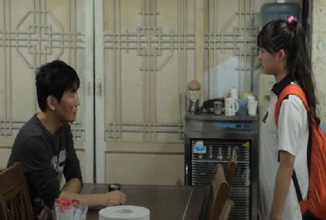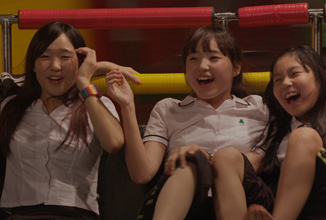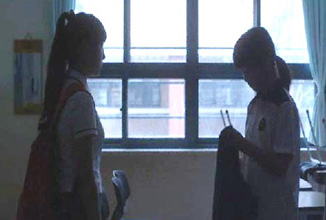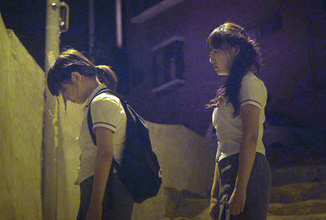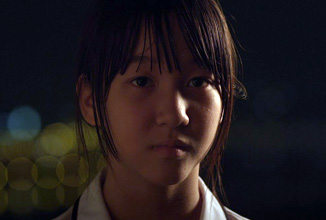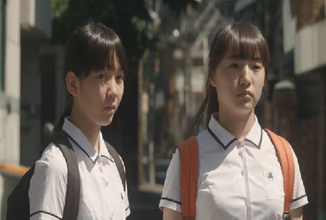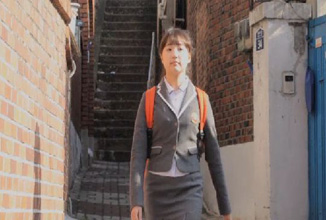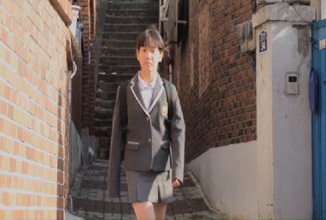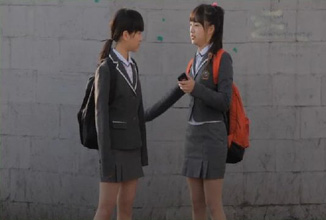
 |
|||||||||
Synopsis:
Review: So, step forward 'MJ'; a short film that in spite of having a duration of just 22 minutes details such a defining moment in the lives of two young girls (stemming from a seemingly inconsequential incident) and does so with a warmth, beauty and depth of which any two-hour-plus feature would be proud:
As already mentioned, 'MJ' begins with a scene in which the titular character's father unleashes his drunken fury outside Ye-min's home (even though the subject of his violent rant, Ye-min's dad, is not actually at home) but while fitting perfectly with and indeed initially appearing to herald another hard-hitting storyline akin to those referenced above, its uses are in truth more extensive and less blatant. Implying not only a home life for Min-ji with a parent prone to violent, drunken outbursts (and by extrapolation for Ye-min, too, considering the full links between the two girls' fathers that later become apparent as well as the fact that her dad is the one being blamed for beating up Min-ji's) and of course on a basic level allowing the setting up of the uniform theft that will ultimately underpin the entire story, this scene may indeed have a harsh undercurrent but, to my mind, deliberately so to gradually underline the polar opposites of the volatile relationships of the older generation and the childhood warmth and acceptance that will soon form the basis of the girls' friendship. Not only that, but a tiny passing moment within this scene in which Ye-min stands and heads straight for her door ready to stand up to the man causing the furore outside not only speaks of her absolute confidence in herself - especially when viewed alongside her altercation with him the next day at his restaurant - but also stands in stark contrast to Min-ji dejectedly hanging her head in silence on being told to mind her own business by her father, after quietly asking him "What have you done this time, dad?". Considering how similar their fathers (and therefore home situations) increasingly show themselves to be, this to my mind allows a clear statement that the early differences in their personalities and confidence levels come from their standing in the other significant portion of their lives; i.e. their gaining acceptance (or lack thereof) and friendship/respect from their peers. As if to underline the point, 'MJ' shortly after features a musically accompanied 'montage' sequence showing Ye-min spending the day hanging out with her closest friends. We watch her checking to make sure her buddies' short skirts are just long enough to prevent their underwear showing as they walk up steps; keeping an eye on the train station guard to allow them to jump the barrier and travel free; and challenging them to (not to mention winning) a mechanical street punching ball game, but here too the sequence's underlying importance only becomes clear at a later stage: As the two girls spend time together (after the full story of the uniform theft/return has been revealed), we see Ye-min taking Min-ji through almost exactly the same activities - going to a clothing shop to have Min-ji's skirt shortened; riding the train together; Ye-min attempting, in vain, to convince Min-ji to take a swing at the mechanical punching ball - and gradually, ever so gradually, we see shy and introverted Min-ji begin to open up to her new associate, in the process giving her the confidence to approach Ye-min for her help with an issue that faces them both later that night.
(As a side note, it could be claimed that Min-ji's polite, shy and repeated refusal to punch the mechanical punching ball perhaps implies a deep seated aversion to violence and her sneaking into school in the early hours of the morning to put two chairs together to lie down and sleep on subtly implies something further about her home life, but whether that truly is the case, I admit, is pure conjecture on my part). Cast: Yeom Da-hae (as Ye-min), Oh Yu-jin (as Min-ji, aka MJ)
Summary: Beautifully understated in its narrative realisation, 'MJ' takes a seemingly inconsequential, almost passing moment and deftly details the part it plays in changing the entire life of a young woman for the better. Though just 22 minutes in duration, director Kim Hee-jin's Korean Academy of Film Arts short easily stands alongside, and in contrast to, the plethora of hard-hitting two-hour-plus features centred on the journey from adolescence to adulthood; its warmth and uplifting nature becoming ever more noticeable (and indeed welcome) by direct comparison.
'MJ' (2013) / Directed by Kim Hee-jin |
|||||||||
All images © Korean Academy of Film Arts, Korean Film Council (KOFIC) Review © Paul Quinn |
|||||||||
